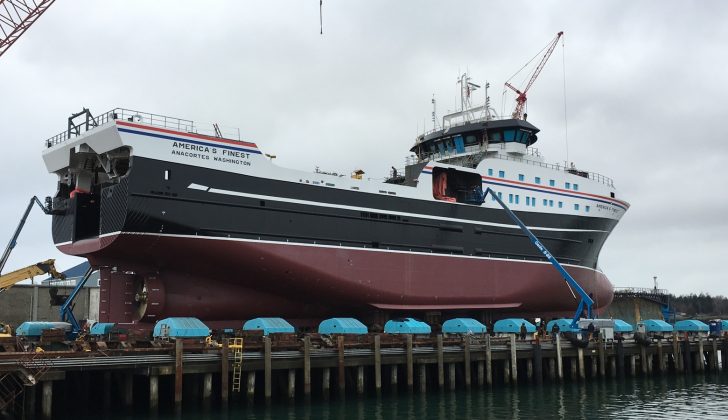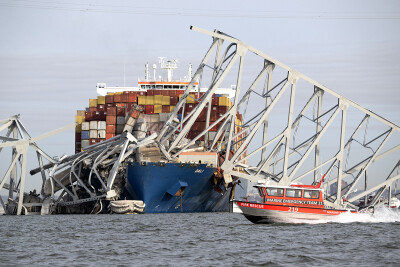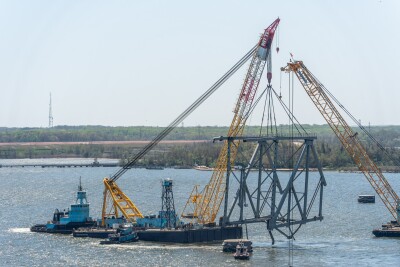A $75 million fishing trawler that’s been stranded at a Washington state shipyard may finally be launched after the U.S. Senate approved a Jones Act waiver Wednesday.
The 264' America’s Finest was built at Dakota Creek Industries, Anacortes, Wash., as a state of the art factory trawler for Fishermen’s Finest, Kirkland, Wash. But the use of some steel fabricated in the Netherlands ran afoul of the Merchant Marine Act of 1920 – better known as the Jones Act – that sets a limit of 1.5% by weight on the use of foreign-worked material.
The overage put the new vessel at risk for failing to qualify for Coast Guard documentation, putting both the fishing company and shipyard at significant risk. On Wednesday the Senate approved the Coast Guard reauthorization act that offered compromises for maritime industry groups that have been at odds over the fate of the troubled trawler.
Provisions in the 389-page bill include a new regulatory framework for regulating ballast water discharges, and additional maintenance funding to extend the service life of the Polar Star, the Coast Guard’s sole operational heavy icebreaker.
“This bill includes many provisions important to our Coast Guard, our environment, and to our shipbuilding community,” said Sen. Maria Cantwell, D-Wash., the senior Democratic member on the Senate Commerce Committee who helped put the package together. “It represents a true, bipartisan effort to find solutions and put those solutions into action.”
While allowing the America’s Finest to be documented and fish in U.S. waters, the measure still “ensures the Coast Guard has the authority to review the project to protect the Jones Act,” according to Cantwell. The bill further provides that the Coast Guard and Department of Commerce must continue to investigate how the trawler project came to overrun the allowed percentage of foreign-fabricated components. Potentially the department could revoke the vessel documentation if it is found the companies knew they would violate the Jones Act, which the companies have vigorously denied.
The House of Representatives still must approve the legislative package but backers anticipate it will be passed in the lower House and sent for President Trump to sign.
The proposed waiver had been opposed by maritime industry groups that saw it as a potential erosion of the Jones Act protections for U.S. shipping and shipbuilders — with Jones Act critics taking opposite positions.
The ballast water regulation aspect of the bill aims to resolve a 12-year debate over how to regulate ballast water that can carry invasive species, like zebra mussels that threaten the Great Lakes ecosystem.
The problem is managed by both the Coast Guard, which inspects commercial vessels, and the U.S. Environmental Protection Agency, which regulates ballast water under the federal Clean Water Act. Maritime groups like the American Waterways Operators and Lake Carriers Association had lobbied to have Congress hand all authority over to the Coast Guard.
The Senate rejected that idea in April, and the newly approved bill keeps EPA authority and calls for developing specific ballast water regulations. As those take shape the legislation would also mandate a national standard superseding state-by-state regulations, which the maritime transportation industry wants to avoid.
For the Polar Star, the legislation calls for a “rolling recapitalization” of the icebreaker launched in 1976, according to Cantwell. The goal is to extend its service life to 2025, long enough for the first in a new class of heavy icebreakers to be deployed.
The Polar Star has come close to suffering major engineering failures during its recent annual deployments to the Antarctic in support of the U.S. science mission there. If that ship is disabled, the U.S. would be left with just the single medium icebreaker Healy.





